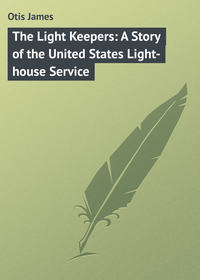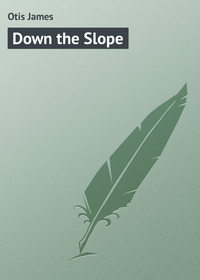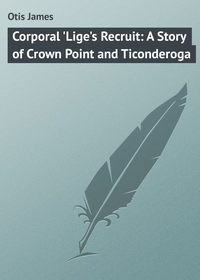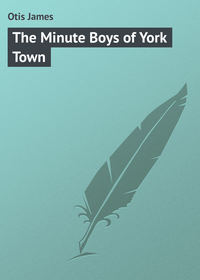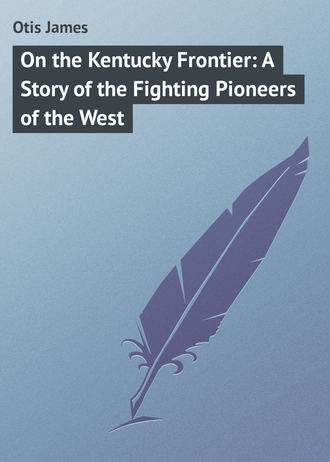 полная версия
полная версияOn the Kentucky Frontier: A Story of the Fighting Pioneers of the West
"When shall we return?" I asked, for now that the homeward journey was being considered, I, who really had no home, was eager to begin it.
"It was understood between Major Clarke and myself that I might be at liberty to turn back whenever Captain Bowman should state he no longer required my services, and I reckon, lads, that the time has come. Wait you here until I learn what he has to say regardin' the matter."
Within an hour it was decided that we three were to carry Captain Bowman's report to Major Clarke, and when I lay down to sleep that night it was with the knowledge that at the first light of dawn we would begin the sixty-mile journey, counting on making it within four-and-twenty hours with but little labor, since from this point we could proceed in a canoe, aided by the swiftly running current.
We set out as had been decided upon, one of the settlers in Cahokia willingly lending us a dugout, with the understanding that we should leave it at Kaskaskia to be returned whenever opportunity offered, and before midnight Simon Kenton was giving to Major Clarke the account of our successes.
We remained three days longer at this post; but all that happened which concerned us three may be told in few words.
It was decided that all save those who chose to remain to man the garrisons might return whenever it pleased them, and, knowing that fifty or more who had left relatives on Corn Island were counting on going back soon, we three waited for them in order that our force might be so large as to deter the savages who were possibly lurking about the banks of the Ohio River, from making an attack.
When three days had passed, however, we found that none of the men were disposed to begin quite so soon what would doubtless prove an arduous undertaking, and Simon Kenton laid the matter before us by saying:
"Lads, I am eager to get back into Fauquier County. If it so be you have no stomach for layin' around here eatin' the bread of idleness suppose we start to-morrow mornin'? There is nothin' to keep us, and much to incline our hearts toward the journey."
Unless I have utterly failed in making it appear here that I had a great affection for my mother, it can readily be understood how we answered the scout, and without delay we set about the few necessary preparations for the voyage, determined to leave Kaskaskia before daylight next morning.
And now at this point let me copy what I read many years later regarding Vincennes:
"The stronger and more important post of Vincennes, situate on the east bank of the Wabash River, one hundred miles above its entrance into the Ohio, was yet unsubdued, and Major Clarke felt that the object of his mission would be but half accomplished if he did not gain possession of that place. It was necessary to garrison Kaskaskia and Cahokia in order to retain them, and to do this would so weaken his little army that he could, scarcely hope for victory in an attack upon Vincennes, unless he should be as successful in effecting a surprise as he had in capturing the posts already in his possession. While thus perplexed and doubting which course to pursue, he communicated his desires to Father Gabault, a French priest, who agreed to bring those inhabitants of Vincennes over whom he had pastoral charge, to the support of the American cause. The influence of the priest was successful; the inhabitants arose in the night and cast off their allegiance to the British, expelled the garrison from the fort, and pulled down the English standard. The American flag floated in triumph over the ramparts in the morning."
All this was done before we three were come again to Corn Island, and I question if the British king ever lost more territory at a less cost in blood, either on the part of those who made the capture or the hirelings who should have held the garrisons, than in this expedition of Major Clarke's into the valley of Mississippi.
I am now come to be an old man, and yet since that time have heard but little spoken concerning the achievements of Major Clarke and his force of four hundred, when the most fertile portion of the Mississippi River was taken from the Britishers and made a portion of the American colonies.
We had done our work well, as it seemed to me then and does now, although in the telling of it there is none of that clash of arms and cheers of triumph which have accompanied far smaller achievements.
And here would my story properly end but for the fact that we three must make the journey down the Mississippi to the Ohio, following the course of this last noble river on foot, because we could not well stem the current in a canoe, through a country infested by savage enemies, who would use every effort to take our lives.
CHAPTER XI.
HOMEWARD BOUND
We spent no time in leave-taking after once having made ready for the journey. It was as if we three formed a separate command, and had no comrades among the main body of the volunteers, therefore it was not necessary we should say good-by.
Simon Kenton was to carry up the Ohio certain papers with which Major Clarke had entrusted him, and once these were in his possession there was nothing to detain us at Kaskaskia.
We took our departure from the post a full half hour before daybreak, when none save the sentinels were there to see us push off from the shore, and allowed the canoe to drift down the river until we were come to the Ohio.
It would be more laborious to paddle the dugout against the swift current than to walk, and we had already decided to make our way through the wilderness on foot, ever keeping within a short distance of the river, where we might expect to get the earliest information if the savages were moving about bent on mischief.
We came to a halt at a point where we waited for the flat-boats on the journey down, and here a day was spent in procuring and cooking meat, for Simon Kenton had decided that once the long tramp was really begun we would push forward at the best possible pace. It was reasonable to believe that in a short time we would have arrived at that portion of the country where it might not be well to discharge a rifle simply for the purpose of killing game.
We did not expect to make the journey without some danger of coming across small parties of the painted brutes who thirsted for the blood of white people; but it was not in our thoughts that we should encounter any serious dangers. The worst of the tramp, so we believed, might be the labor of pushing on through the underbrush until the many miles which lay between us and Corn Island had been traversed.
Simon Kenton was in particularly good humor on that morning when, all our preparations completed, we left the camping place with our faces turned toward the north, and I was exceedingly happy, for at the end of the journey my mother was waiting to greet me.
During two full days we pressed steadily onward, seeing nothing to cause alarm, and making reasonably good progress, and then came that which threatened a fatal ending to what had been a most successful journey.
We encamped on the second night in a small thicket of scrub where the foliage was so dense that the chill night wind was shut out as completely as if we had been within four walls of stout logs, and felt so secure that Simon Kenton himself had proposed we build a light blaze to cook a turkey we had just killed.
The meat was roasted, and we ate such a supper as can be enjoyed only by those who have performed a full day's labor, and after the meal was come to an end Paul and I fell asleep even as we sat before the fire.
How long we were thus unconscious I am unable to say; but it seemed to me as if I had no more than crossed the borders of dreamland before I was awakened by the pressure of a heavy hand over my mouth.
In the forest one becomes accustomed to awakening quickly, and without starting up.
When the eyes are open the first thought is as to the reason for thus being aroused, and due heed is given to all the surroundings before any movement is made.
Therefore it was I understood at once that Simon Kenton's hand was covering my mouth, and that he was hurriedly burying the light embers with ashes.
Pressing his arm to let him know I was thoroughly aroused, I rose to a sitting posture.
No sound brake the stillness of the night, for, sheltered as we were by the scrub, even the moaning of the wind failed to reach our ears.
Kenton was awakening Paul, and he, brave lad, made as little disturbance on thus being aroused as if all his life had been spent on the frontier.
It was to my mind a certainty that the scout had heard or seen savages, and I drew up my rifle to assure myself it was in proper working order.
It is by no means soothing to the nerves to be thus aroused and forced to remain on the alert in ignorance of what threatens. I know of no situation more trying, and while I inwardly trembled with apprehension, my eyes sought out Paul in the gloom to learn how he was bearing up under what many old, experienced hunters have told me was, in their opinion, the most trying of all border warfare.
The lad sat silent and motionless, his rifle in hand, and though it was impossible to distinguish his features, I knew full well he was as calm and placid as when we remained concealed in the thicket just beyond the stockade at Kaskaskia, when I believed a desperate battle was before us.
During perhaps half an hour we three remained in the same position as when first having been awakened, and then Simon Kenton began to creep cautiously out through the underbrush, having first motioned for us to remain quiet.
He was bent on learning what had alarmed him, and but for advertising myself as a coward, I would have insisted, as well as I might by gestures, upon his remaining with us, for to me, almost anything was preferable to separation.
I checked the impulse, however, but moved closer to Paul, and he, dear lad, pressed my hand as if to give me courage.
That he, whom I had at the outset considered the weakest of the party, should be the one to encourage, shamed me, and I threw off his hand as if in anger, when in reality it was nothing save nervous fear which prompted the movement.
As nearly as I could judge, Simon Kenton had been absent ten minutes before we heard anything whatsoever, and then the report of a musket, followed by a scream of pain, caused the blood to bound in my veins.
Instinctively I leaped to my feet when I should have remained motionless, and Paul laid hold of the skirt of my hunting-shirt as if fearing I might be counting on rushing out.
One, two, three minutes passed, during which time the most absolute silence reigned, and then a slight rustling of the branches told that the scout was returning.
I breathed more freely, knowing he was not the one who had given vent to that cry of pain, and stepped forward to learn how serious was the danger which threatened.
"We have run across thirty or more reptiles – most likely the same that were met while coming down the river," he whispered in my ear as I bent forward eager for information.
"Why did you fire?" I asked, believing for the moment that by such act he had told them where we lay concealed.
"They had learned where we were, and now completely surround us. It's a case of fightin' our way out, lad, if we count on gainin' Corn Island. It is better to make a move at once, than wait till they are ready to close in on us."
I understood by these words that Kenton believed the situation to be most dangerous, otherwise he would not have suggested we make a move in the night when the savages would have a great advantage over us, and, as usual in such cases, my heart grew cowardly once more.
While I stood there undecided the scout hurriedly repeated to Paul that which he had told me, and I saw the lad rise to his feet without hesitation. He was even then, as he has since many times proven himself, my superior in all that goes to make up a frontiersman.
"Follow me," Kenton whispered, "and when you are forced to fire, see to it there be no delay in re-loadin' your rifle. Accordin' to my way of thinkin' we'll have to fight ourselves through this gang, an' the more we disable 'twixt now an' night the easier will be our work to-morrow."
There was in my mind the thought that we were now where we must keep up a running fight until one party or the other was shot down, and, considering the fact that they outnumbered us at least ten to one, it seemed most likely ours would be the side that went under.
When danger comes close upon me I forget my cowardice, as a rule, and so it was now. There seemed little chance we could fight our way through where were so many to oppose us, and the odds were all in favor of the savages.
Realizing this fully, as I believe Simon Kenton did also, I ceased to think of the cause I had for fear, but set my teeth hard, resolving to give the painted wolves good reason to remember me after they had shot us down.
Simon Kenton was not disposed to linger; he understood of what advantage in a fight is the first blow, and was eager to deal it.
He waited only long enough to assure himself we two lads were ready for the hot work before us, and then turned to leave the hiding-place which, as he had said, was already surrounded.
Paul would have brought up the rear, but that I held the position as belonging to me. Surely a lad who had always lived in towns could not reasonably expect to be allowed such a post of danger when there were others with a right to claim it.
That the savages were keeping a keen watch we knew instantly Simon Kenton stepped outside the dense thicket, for then came the report of a rifle, and a bullet whistled past my head so near that I could feel the "wind" of its flight.
It was a queer act, when the darkness was so intense that one could not distinguish an object twenty paces away, yet instinctively we three darted behind the nearest trees for shelter, and there stood straining our eyes in the hope of being able to discover a living target.
It was like looking into a deep well, to peer ahead, and all three of us must have understood at the same instant that it was little less than folly to remain there with any hope of sending a bullet home, for Paul had just turned to continue the flight when Simon Kenton whispered to me:
"We cannot benefit ourselves by remainin' here. The best plan is to continue on up river, makin' as many miles as possible before daylight."
Having said this he darted forward, forcing Paul to fall into line behind him, and I came close at the latter's heels.
Now was begun the oddest fight ever seen on the Ohio River.
We three were pressing forward as if it would advantage us much to gain a few extra miles before morning, and the savages followed cautiously, firing at random now and then, although they could not hope a single bullet would take effect.
Several times we halted in the hope that the reptiles, thinking only of overtaking us, might come up within shooting distance; but they were too wary to be caught by any trick of that kind.
Whenever we came to a full stop it was as if all nature ceased breathing, for we could not hear the lightest whisper amid the foliage, and when the flight had continued in such fashion for an hour or more, Simon Kenton said as we stood side by side listening intently for some token of the villains:
"We won't get a fair shot at them until daylight, an' then they'll have the same chance at us. I reckon we'd better make all the distance we can while it is dark, an' then lay by when the sun rises."
To my mind it could benefit us but little if we approached a few miles nearer our destination, for unless these wretches could be beaten back within a reasonably short time, they would succeed in killing us before we could come within fifty miles of the point we most desired to gain.
However, while holding death at bay for a few hours more or less we might as well have our faces turned in the right direction, and I was ready to do whatsoever the scout suggested, for, as I have said, fear had fled from me now that our position was so desperate.
We alternately drove ahead at full speed, and stopped to take breath. The Indians fired at random now and then, hoping that the sound of our footsteps might serve as guide; but they inflicted no more injury on us by shooting, than we did on them while we refrained from discharging our weapons.
In such manner was the night passed. We had not fired a shot, while the painted crew in pursuit had wasted twenty bullets or more.
Having walked all day, this severe exertion throughout the night wearied me excessively, and when the first gray light of coming dawn filtered through the foliage, it seemed to me as if I was on the verge of exhaustion.
The labor had told even on Simon Kenton, and Paul was keeping the pace only through sheer force of will-power.
It was a wondrous relief to me when the scout pointed ahead to what appeared to be a dense growth of bushes, through which ran a tiny stream, as he said:
"I reckon we'll find no better place in which to make a stand, than there."
"Almost anything will please me so that we come to a halt speedily, for I'm well-nigh winded," I replied, speaking with difficulty because of my heavy breathing, and in another instant we three stood facing each other in the thicket, where as yet the light of a new day had not penetrated.
The savages might not approach very near during the darkness without taking more risks than such reptiles fancied, and during a certain time we need not fear molestation.
Paul and I flung ourselves at full length on the ground, for in no other position did it seem possible to recover from the exhaustion which beset us; but Simon Kenton remained standing at a spot from where he could have a view of some portion of our surroundings when the sun had dispelled the gloom.
"I suppose there is good reason to believe the Indians will kill us before we can arrive at Corn Island?" Paul said in a tone of one asking a question, after he had recovered his breath sufficiently to speak, and Simon Kenton replied quietly.
"Two or three such races as we have had this night should give them good cause for discouragement."
"It is a question whether they or we are getting the worst of this business," I added, trying to speak calmly, as had my comrades; but making a bad job of it.
"Twenty-four hours is a long stretch," Paul said thoughtfully, "and it's all I can do to keep my eyes open."
"Go to sleep, lad," Kenton cried. "We must contrive to get some rest 'twixt now an' night, an' if you two take a nap at once I'll have a chance later."
It may seem strange that boys should be able to sleep under such circumstances as these, and yet the permission had no sooner been given by the scout than I was stretched out at full length, my eyes closing despite all efforts to keep them open.
The report of a rifle, discharged near at hand, awakened me, and I looked around to see the scout reloading his rifle.
"Did you wing your bird?" I asked sleepily.
"I hope never to use this 'ere piece again if I didn't. The sneak has been wrigglin' his way toward us for the last ten minutes, an' I only waited to let him believe he was keepin' his red carcass out of sight, although I marked it plainly from the instant he started."
"Have you seen the others?"
"Yes, now an' then through the bushes; but not in such a fashion as I wanted in order to get a good aim. They've camped down somewhere near that big gum tree yonder, needin' rest as much as we did, I reckon."
"How long have I been asleep?"
"Three hours or more."
"Then it's time you took a turn at it," and I rose to my feet, Paul rising up at the same time.
Simon Kenton insisted that we lie down again; but it was to me as if the repose had been sufficiently long, so thoroughly was I awakened, and after a short discussion he did as I suggested.
It is needless for me to set down all that was done or said during the remainder of this long day.
Kenton slept a full four hours, and during that time we had fired twice at the skulking reptiles as they flitted from one tree to another, feeling certain that some of the bullets had taken effect.
Then the scout ordered us to get more sleep, nor would he listen to my assertions that I was fully recovered from the fatigue which had beset me so sorely.
"You have another long race before you, an' stand in need of more sleep if you count on holdin' such a pace as I shall set from the goin' down of the sun till it rises again."
"How long do you expect bein' able to keep up such a flight?" Paul asked quietly, as if it was a matter in which he had no great interest.
"So far we seem to be doin' rather better than holdin' our own, an' I reckon we'd best keep up the game. At least three of the painted snakes are feelin' the worse for havin' begun this little chase, an' we're as sound as ever."
It was on my tongue's end to say that we could not hope for the same good fortune during another night of racing through the forest when it was too dark to distinguish anything not directly in our path; but I checked myself in time, for no good could come of speaking dispiriting words while we were in such a desperate situation.
We two lads lay down again to sleep, in accordance with Kenton's command; but were aroused for a few moments when the scout discharged his rifle, and I heard him mutter to himself:
"That makes the fourth to-day, an' if we can keep up this play two nights more, they may come to believe that the game is not worth the candle."
Sleepily I thought we might find before many hours had passed that all the shooting was not to be done by us; but the idea was no more than in mind when my eyes closed again, and I was not conscious of the surroundings until Kenton shook me roughly.
"It's time we pushed ahead once more," he said in a whisper as I seized my rifle, believing the savages were about to make a determined attack, and he added with a low laugh, "There's no more danger threatenin' than when you was last awake, lad; but the night is well on us, an' we should be movin'."
He awakened Paul, and the little lad rose to his feet ready for any emergency; but speaking not a word.
We had yet some portion of our meat, and from this a hurried meal was made, after which Simon Kenton showed himself ready to set out once more on what I believed was a fruitless journey, for it did not seem possible we would live to finish it.
It was like a nightmare, that race through the thicket with the murderous fiends close on our trail, shooting now and then when in the gloom the waving branches told of our course.
Kenton kept his word, so far as setting a rapid pace was concerned. Never before nor since have I strained every muscle and nerve for so many hours on a stretch.
There were times when we pressed on as if running a foot-race, and more than once did one or the other of us come full against a tree with such force that we were hurled backward at full length on the ground.
There was no time to attend to bruises, however severe, for close in our rear came the relentless brutes, hoping, most likely, for just such a mishap when they could lessen our number by one.
I believe they fired at us fifty times before we halted for a day's rest which must be spent in defending ourselves, and by the mercy of God no bullet came nigh us.
I watched eagerly for the first signs of dawn; my breath was coming thick and fast, and I feared lest I might fall and not find myself able to rise again.
Paul had kept close at Kenton's heels without betraying fatigue or distress; but just at the moment when it seemed as if I must halt, whatever might be the consequences, he cried sharply:
"I can go no further. You two must keep on without me! It is better that I be left behind than for all to perish!"
"We'll all come out of it with whole skins, or fall together," Simon Kenton said sharply. "Try to hold the pace, lad, till we find a place in which we can defend ourselves."
Even as he spoke we had arrived at a spot where half a dozen large trees had been overthrown by the wind, forming exactly the kind of a fortification needed by those sorely beset as were we.
Kenton helped Paul over the logs into the very center, and I followed with many a stumble, falling on my face, utterly blown, when we were in the middle of the timber network.


